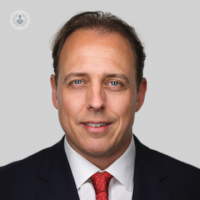What kind of diet and lifestyle help with acid reflux?
Written in association with:Acid reflux can cause discomfort and a number of unpleasant symptoms which affect quality of life. In this informative article for patients, highly respected consultant ENT surgeon and laryngologist Mr Nick Hamilton sheds light on the variety of symptoms inked to acid reflux and how the problem is diagnosed. The leading specialist also offers expert advice on the key changes to diet and lifestyle which can help patients to manage the condition.

How does acid reflux occur?
Acid reflux occurs when the stomach fluid containing enzymes and acid are regurgitated into the food pipe or throat. Most people experience this from time to time but in some, it can occur more frequently and cause inflammation within the lining of the throat and food pipe.
What are the symptoms of acid reflux?
A range of symptoms have been linked to acid reflux. These include symptoms in the food pipe, such as heartburn, and symptoms in the throat, such as a sensation of a lump (globus), a hoarse voice, sore throats, chronic cough, throat clearing, and choking episodes.
What is ‘silent reflux’?
Silent reflux refers to symptoms occurring within the throat, such as the sensation of a lump, without indigestion or obvious reflux of stomach contents into the throat. Silent reflux is sometimes referred to as laryngopharyngeal reflux.
How do ENT specialists check for acid reflux?
An ENT specialist will discuss your symptoms and try and identify factors in your diet or lifestyle which may be contributing to acid reflux. They will examine your throat with a small flexible endoscope to look for signs of inflammation.
Whilst these steps can suggest acid reflux, they do not provide a definitive diagnosis. To do this, a more invasive test is required. However, this step is often unnecessary as the symptoms commonly settle with treatment. It is also important to be aware of the ongoing debate over the extent that acid reflux causes throat symptoms. Your ENT specialist can discuss this with you in more detail.
How is acid reflux relieved? What is the role of diet?
If your ENT specialist detects possible acid reflux, they may recommend dietary and lifestyle modifications (see advice below), medication or a combination of the two.
When is medication needed?
If the symptoms are mild and there are dietary and lifestyle factors that can be modified, acid reflux can be managed without the need for medication.
In moderate to severe symptoms, or in mild symptoms not responding to dietary measures, medication is considered. This can be in the form of an alginate liquid such as Gaviscon. Alginate liquids form a layer within the stomach that can act as a barrier to prevent acid escaping into the food pipe and throat. Alginate liquids also neutralise enzymes that can cause inflammation if refluxed into the food pipe or throat. In addition to alginates, tablets can be prescribed that act to reduce the acid content in the stomach.
Which dietary and lifestyle modifications can help to resolve acid reflux?
Diet
- Eat smaller regular meals and avoid eating within three hours of bedtime
- Avoid fatty and fried food, spicy food, and food with a lot of acidity such as fruit drinks and vinegar
- Reduce your intake of caffeine to two or less drinks per day
- Avoid fizzy drinks which can be acidic and promote reflux
- Reduce your alcohol intake - some alcoholic drinks, such a white wine, are very acidic and the effects of alcohol on your body makes acid reflux more likely
General health
- Quit nicotine products - acid reflux is promoted by nicotine
- If you are overweight, weight loss will help reduce acid reflux
- Stress can increase the acid content in your stomach so finding ways to reduce stress can help
If you are concerned about the symptoms of acid reflux and wish to schedule an appointment with Mr Hamilton, you can do so by visiting his Top Doctors profile.


